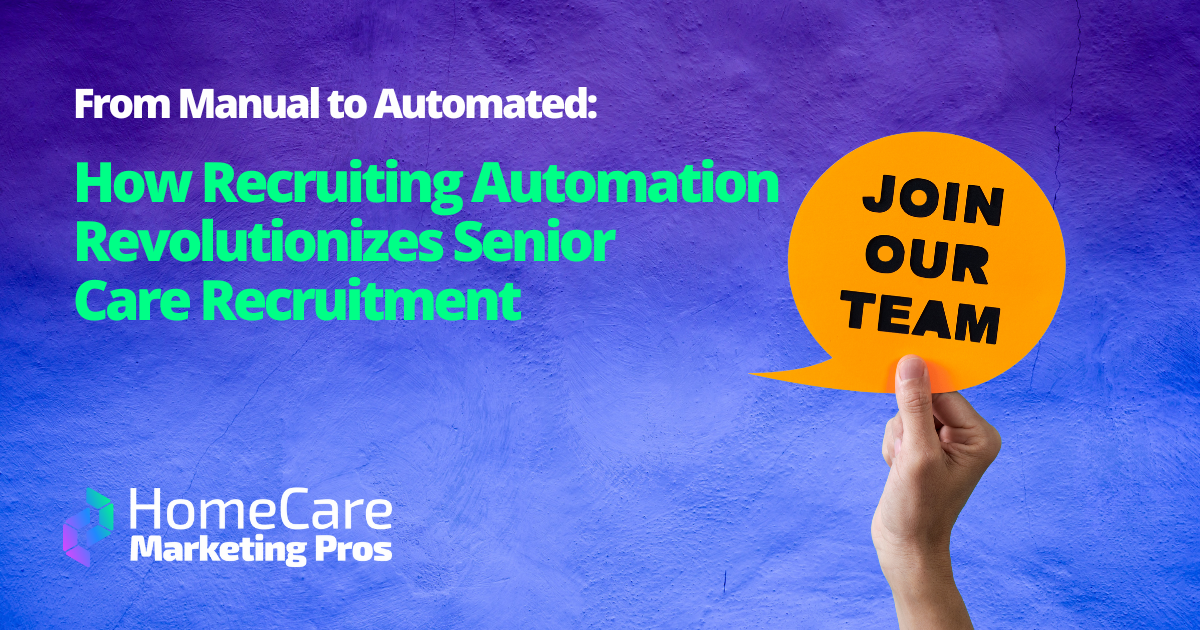Caregiver Recruiting Techniques For Home Care Agencies that Want to Do More Than Just Place Online Ads
As many home care “old timers” can attest, there was a time when caregiver recruiting techniques were much simpler. In those days, agencies would place ads in local newspapers that resulted in a fairly-steady stream of applicants. Once the internet age came around, companies relied on a similar strategy by simply trading print publications for online job boards.
But in recent years, caregiver recruiting techniques necessary for success have become much more complex. In fact, some agencies have more client referrals than available home care aides—a phenomenon that would have been nearly incomprehensible just a decade ago!
Forward-thinking leaders must now leverage every possible resource for caregiver recruitment. Here are proven techniques that can help any agency bolster their staff. They are divided between “active” and “passive” strategies.
Active Strategies
1. Nursing School Presentations
Some home care agencies have partnered with nursing schools for years. But with today’s caregiver shortage, the practice should be standard operating procedure. Companies can secure recent CNA/HHA graduates and may even attract long-term RN/LVN students seeking part time work.
Nursing school recruitment can be highly-effective for a few reasons. First, the candidates live within the service geography. Most people attend nursing schools that are near their homes.
Second, nursing school administrators are looking for company partners. Their “pitch” to prospective student often includes the promise of guaranteed work upon graduation. Home care agencies are therefore usually granted the opportunity to speak to CNA/HHA classes nearing completion.
Finally, RN/LVN students often make terrific non-medical caregivers. Although they’re training for clinical positions, many find that caregiving provides both a paycheck and complementary experience. And clients are usually pleased to hear their caregiver is a prospective nurse!
2. Job Fairs
When recruiting for caregivers, it’s important to remember good candidates may come from various walks of life. A generic “job fair” may not sound like a hotbed of home care talent, but the reality is that many potential aides may attend seeking other opportunities. There’s no reason an agency can’t find some hidden gems during the events.
In addition to a strong pool of potential caregiver candidates, job fairs are usually affordable when compared to other forms of advertisement and outreach. Depending on the event and city, there may be several hundred attendees. If an agency secures even a handful of new hires, the ROI may be significant.
3. Social Media Campaigns
Some forms of caregiver recruitment sit on the border of “active” and “passive” strategies. Social media campaigns have certain passive qualities, but the best results come from active engagement. The latter is what separates social media recruiting superstars from their mediocre counterparts.
More active efforts engage the assistance of current employees—both internal office staff and outside caregivers. Agency managers can offer incentives for social media “shares” and “likes.” Recruiters who create the content won’t simply post jobs, but will actively “sell” the company in the process. A big part of social media-based recruiting is highlighting a company’s positive work culture in order to generate candidate interest!
Passive Strategies
1. Referral Programs
Smart home care agencies never lose track of their greatest recruiting resources—their current caregivers! Word-of-mouth referrals are incredibly valuable. They usually result in impressive hire conversion rates in the short term and quality employees in the long term. In other words, great employees usually know people who will make great future employees!
Most companies will benefit from offering compelling referral bonuses to current employees who refer friends or family. While it’s perfectly acceptable to set conditions (for example, the new hire must complete at least 100 hours of work), the incentives should be significant. “Token” bonuses will not motivate participation and may even be offensive to hard-working caregivers.
2. Benefits & Perks
Most home care agency owners know companies develop reputations among potential referral services that may far exceed the reach of their own sales efforts. Word travels fast. But do they also realize their reputation spreads among the tight-nit caregiver community?
Many home care aides run in the same circles. In fact, some families even have multiple members who work as caregivers in the same neighborhood or small city. Regardless of the connections, the point is that people talk. Agencies that provide fair compensation, benefits and employee perks are more likely to earn positive reputations and entice prospective caregivers.
3. Website “Apply Now” Functionality
An old saying goes, “Water follows the path of least resistance.” When it comes to caregiver recruitment, it’s important for home care agencies to make application submittals as easy as possible. Who wants to miss out on great employees simply because a competitor has an easier process?
Something as simple as a prominently-displayed “Apply Now” button on a home care website may contribute to several new hires every month. Agency owners who don’t focus on recruiting nuance are likely missing out on low-hanging fruit!
Conclusion
Ultimately, the infamous caregiver shortage is likely to continue for years to come. It’s simply a matter of demography with the massive aging baby boomer population. There’s no sure-fire way to guarantee a steady stream of new caregivers. But home care agencies that exploit all possible resources and caregiver recruiting techniques are best positioned to stay ahead of the curve!
If your caregiver company is in need of robust home-care specific marketing tools, be sure to consult with the industry’s leader today!













